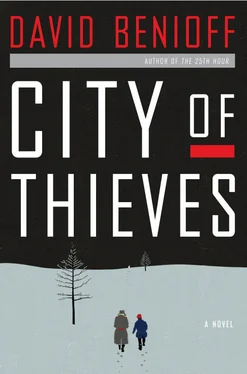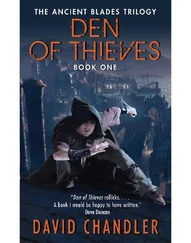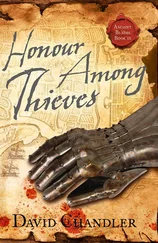“And it wasn’t dyed. You understand?”
“I do,” said Kolya, smiling back.
“Don’t be too worried,” the German told me. “You’re young, still. We all had our awkward years. So tell me, are you any better than your friend here?”
I looked down at the newspaper in my hand.
“I know this says Stalin .” I pointed to the word. “And comrade ?”
“Yes, well that’s a start.”
He gave me an avuncular smile, patted my cheek, and took the paper. I thought he might have felt bad for saying I looked like a Jew.
“Very good. You’ll keep your friend here company in Estonia. A few months of hard work never hurt anyone. This will all be over soon. And you,” he added, moving down to Vika, the last in the line. “Another child. What do you have for me?”
Vika shrugged and shook her head, never looking up, offering the unread paper to the Einsatzkommando.
“Right, another victory for the Bolshevik education system. Good, all three of you to the left.”
We joined the group of grinning illiterates. One of them had worked in a steel mill before and the others were gathered around him, listening to him describe the terrible heat and the danger in handling molten metal. Markov’s betrayer stood just outside this circle, rubbing his bare hands to keep them warm, ignored by everyone.
“Was that Abendroth?” I whispered to Vika. She shook her head.
“Abendroth’s rank is Sturmbannführer. Four silver pips on the collar tabs. This one only had three.”
The company translator was counting each group of prisoners, pointing at heads and moving his lips. When he was finished, he announced to the Einsatzkommando, “Fifty-seven readers. Thirty-eight nonreaders.”
“Very good.”
The sun was down and the air was getting colder. The Einsatzkommando walked over to the folding chair, where his overcoat waited, while the troopers formed the literate prisoners into two rows and ordered them to march. The Russians gave cheerful waves to their less-educated comrades across the way. They marched with precision now, far different from our stumbling procession earlier in the day. Boots rose and fell on the beat: left, right, left, right. The prisoners wanted to impress their German masters, to prove they deserved this chance to serve out their time clipping newspapers in Vyborg.
The Einsatzkommando wasn’t watching them anymore. He buttoned his coat, slipped on his leather gloves, and headed off toward the parked Kübels. The literate prisoners marched to the windowless brick sidewall of the school building, where they halted and faced front. Even then they didn’t understand what was happening to them. How could they? They were good students; they had passed the test and been rewarded.
I looked at Vika, but she was staring off into the distance, refusing to watch.
The German troopers leveled their submachine guns and fired at the line of Russians. They kept their fingers on the triggers until the magazines were empty and the Russian men lay splayed and shredded on the ground, smoke rising from their singed coats. The Germans reloaded, walked over to the wall, and fired single shots into the heads of anyone still breathing.
In front of the schoolhouse I saw the Einsatzkommando greet the young bareheaded soldier who had been filling the fuel tanks. Whatever the officer said must have been funny; the young soldier laughed and nodded in agreement. The Einsatzkommando stepped into one of the Kübels and drove away. The young soldier picked up the empty jerrycans and lugged them toward the schoolhouse. Before he got very far he paused and looked into the sky. I could hear it now, the purr of airplane engines above us. The silver Junkers flew west, in pointed formations of three, for the first bombing raid of the evening. Three after three after three, filling the sky like migrating birds. All of us, the surviving prisoners and the mountain rangers, stood in silence and watched the planes pass.
We slept in a toolshed behind the schoolhouse, thirty-five of us jammed into a space eight men might have slept in comfortably. No one could lie down flat. I sat folded into a corner with Kolya on one side of me and Vika on the other. This was bad for my back but good for my breathing—the gaps between the wallboards provided the only ventilation and if I got too claustrophobic, I could turn my head and suck clean, cold air.
There was no light. The German troopers had nailed the shed door shut; we could hear the guards outside talking and lighting cigarettes, but the prisoners still talked of escape. I couldn’t see their faces and the effect was like listening to one of the radio plays my mother used to like.
“I’m telling you, we could crack it open like a walnut shell. One man puts his shoulder into it, he’d bust right through the wall.”
“You think so? You a carpenter? I am. When they shoved us in here, I got a look at the walls. That’s silver birch. That’s strong wood.”
“And what happens to the man busting through the wall? There’s guards out there waiting with machine guns.”
“How many? Two, three? We rush them, they’ll take a few of us, but we’ll get them.”
“Can anyone see how many are out there?”
I dipped my head and peered through the gap.
“I see only two. But there might be more on the other side.”
“Long as I don’t go first.”
“We all go together.”
“There’s still got to be a first man out and a last man out.”
“I say we wait and do what they say. The war won’t last forever.”
“Who is that, Edik? Why don’t you burn in hell, you old bitch? Didn’t you see what happened out there today? You still trust these pig fuckers?”
“If they wanted to shoot us, they would have shot us. It was only the fancy boys they wanted, the ones in the Party.”
“Ah… you’re a miserable old bastard, you know that? I hope your children shit in your soup.”
Kolya leaned across me so he could whisper to Vika in the darkness, out of earshot of the squabbling peasants.
“That Einsatzkommando… he was right next to us. You told Markov we weren’t going to shoot troopers, we were holding out for Einsatz. So?”
For a long count Vika did not respond and I thought she must have been angered by the insinuation, but when she did speak, her tone was thoughtful.
“Maybe I was afraid. And you?”
Kolya sighed. “It didn’t seem like the moment. Shoot one man and get blasted to pieces?”
“No. But maybe we waited too long. That might have been our best chance.”
I had known her for only a day, but Vika’s comments surprised me. She did not seem the sort to admit doubt, and yet here she was using the word maybe twice in a row.
“I almost did it,” said Kolya, nudging my shoulder. “When he was asking you about your grandparents. I thought he might make you drop your pants, take a look at your meat. I had my hand on the butt of my gun. But we talked him out of it, didn’t we? You like what I came up with?”
“You were good,” I said. “Very quick.”
“I think he wanted to fuck me, to be honest. He had that look.”
“What I said before about Jews,” whispered Vika, touching my knee in the darkness, “just so you know—anyone the Nazis hate so much is a friend of mine.”
“He’s only half a Jew,” said Kolya. He meant it as a compliment.
“The better half,” I replied. Vika laughed. Until that moment I hadn’t known she was capable of laughter and it was a strange sound, but not because there was anything odd about her laugh. She laughed like a normal girl.
“What were you doing before the war?” I asked her.
“I was a student.”
Читать дальше












